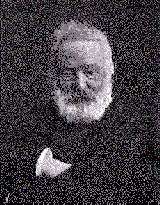
Born: February 26, 1802, in Besançon, France
Died: May 22, 1885, in Paris, France
Victor Hugo was a prolific French poet, novelist, and playwright. He is noted for his contributions to romantic movement. In France, he is best remembered for his poetry while in North America, he is remembered for his novels.
His parents were Joseph Hugo and Sophie Trébuchet. His father was an officer in Napolean's army. While her husband was away from home, his mother reputedly had a relationship with LaHorie, a general who fought in opposition to Napolean.
Heavily influenced by Chateaubriand, Hugo established himself as a writer very early. By the time he turned twenty-five, his poetry had received first prize from the Academy of Floral Games at Toulouse, he was given a royal prize by Louis XVIII, and was acknowledged as leader of the "Young Poets.
One year after his mother's death in 1821, Hugo married Adèle Foucher, a childhood friend. At the wedding, his brother Eugène went suddenly insane because of his own love for Adèle. Of the five children born to Hugo and his wife, four survived.
By the late 1820s, Hugo was writing plays. The best known from this time was Hernani, published in 1830. His marriage, however, was not so successful. His wife, tired of her husband's work, had begun an affair. Although Hugo had been a devoted family man, he also took a mistress, Juliette Drouet. She was kept secluded and lived on a limited budget, but she loved Hugo until her death.
With the success in 1831 of The Hunchback of Notre Dame, Hugo became a prominent social figure in France, was elected to the French Academy in 1841, and was raised to the Chamber of Peers in 1845. Over time, he gradually shifted his political views away from Napoleon's side. He produced little during this time, due to his active political life and the shock over the drowning deaths of his daughter and son-in-law.
Because of his opposition to Napolean, Hugo was exiled for nineteen years when Napolean obtained power in 1851. He spent most of his time in the Channel Islands, taking both his family and his mistress, Juliette, with him. During the exile, he was extremely productive, publishing both poetry and three novels. The best known of these novels is Les Misérables, which sold over seven million copies by the end of the century.
His wife died in 1868. Hugo returned to Paris in 1870 and continued an active life until his death in 1885.